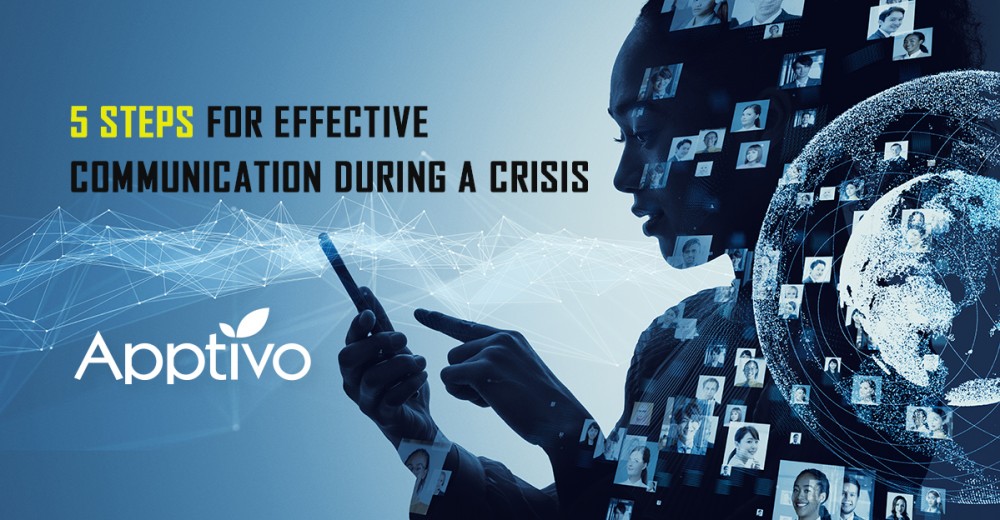
Healthy communication with your customers is critical, but a healthy communication during this global pandemic is paramount. The worst thing you can do to your business during a crisis is do nothing, just push your business into a state of paralysis. We can’t emphasize more on the dire need for destroying your traditional communication infrastructure and constructing a technology-driven communication of your company’s vision, culture, and values to your customers through formal and informal channels.
However, in order to effectively communicate in this challenging time, it is crucial to introspect by asking yourself these questions before you dive into designing an effective crisis communication strategy for your company:
- What – Identify the message you want to send across and ensure that it is customer-centric, addressing the current scenario.
- What – Identify the message you want to send across and ensure that it is customer-centric, addressing the current scenario.
- Who – Segment the audience by using customer data analysis to increase the conversion rates and develop the content accordingly.
- When – Identify the right time to send the message to grab their attention and also focus on how much you need to communicate.
While it might be overwhelming to drive sales during this crisis, here are a few steps you can follow to effectively communicate and limit potential damage to your company’s reputation:
1. Be Transparent, Honest And Clear

Honesty, transparency, and consistency are the pillars of effective communication. Entrepreneurs often tend to retreat and run away from difficult conversations; however, this is not the time to hide away from customers. This is a time to be more transparent than usual, communicate more openly, and consistently engage in communications with the customers. Review your entire messaging stream as you wouldn’t want to be perceived as insensitive or out of touch with current events. You must say as much as you know, but no more than that, you’ll get hammered if you end up misstating facts.
2. Get Closer And Empathize

Empathy is a critical part of sales. You need to dig in and analyze your current financial situation to figure out what kind of help you can sustainably provide to your customers without going bankrupt. Find a way to personalize your products and services, making them useful for your customers right now during this crisis. It is imperative to focus on serving your clients and solving their problems. Prove to your customers that you care and that you’re there to support them to build a strong customer base.
3. Train Communications Team And Establish Protocols

The role of a spokesperson is full of challenges and pitfalls that could cost your company a fortune. It’s your responsibility to minimize the spread of misinformation on your company’s behalf by ensuring your communication team has employees who have been screened and trained well. It is also essential to have a set of protocols in place that are clearly communicated to the entire team to ensure customers are responded in timely and accurately to protect the company’s reputation.
4. Use The Right Communication Medium

Your conventional cold calls won’t work anymore. During this crisis, you need to avail all the technologies available to reach your audience and if you haven’t already taken advantage of social media, you’re missing out on a very effective way to reach more than half of the world’s population. It is imperative to leverage social media marketing to interact with prospects and customers on a more personal level. Unfortunately, around 50% of small businesses aren’t using social media to promote their business. Social media marketing is a powerful tool that helps ‘humanize’ your brand.
5. Monitor, Track, And Communicate

During a crisis, it is critical to communicate proactively with your customers. Yes, we’re in the middle of a global pandemic, but if you wait until your customers reach out to you, just remember that your customers’ silence doesn’t negate the value of communicating with them. They might be considering whether your service is essential and your product might be on their list of things to cancel.
When you create different customer segments, you can develop a plan to reach out to them proactively and in a more personalized manner. Tracking customer satisfaction and feedback can increase conversion rates, boost customer loyalty, and eventually help your business thrive. You need to take in whatever feedback your customers give you and then make decisions accordingly.
Conclusion
In times of a crisis, it can be frustrating to see your customers not react the way you wanted them to, but it was only because your approach was wrong. Now that you are equipped with the right tactics to communicate effectively, you can carefully design an effective communication strategy and be an exception to the conventional head-in-the-sand attitude that a lot of entrepreneurs are having towards the global crisis.
Latest Blogs

Role Of CRM In Travel And Tourism Industry
Travel and tourism have been a significant part of everyone’s life since the ancient period. When we skim through the pages of history, It should be noted that humans were initially nomads before they became settled in one place. They...
Read more →
WHAT IS CRM TECHNOLOGY?
Introduction CRM is a technology that helps manage the entire customer information and interactions in order to build and maintain superior customer relationships. The CRM solution replaces spreadsheets and other different applications, which makes it easy for the businesses to...
Read more →
Everything you need to know about the Annual Maintenance Contract!
1. What is an Annual Maintenance Contract? 2. Benefits of Maintenance Contracts 3. How can Apptivo CRM help you manage maintenance agreements and vendors? 4. Summary Think about getting the confidence that the machinery is well-maintained and performing optimally, without...
Read more →
